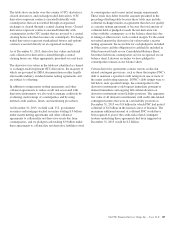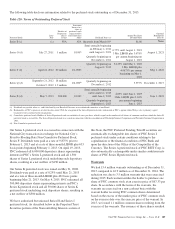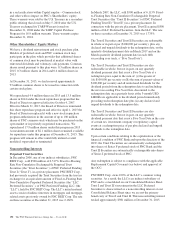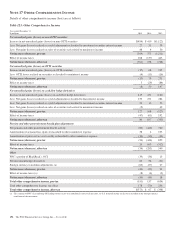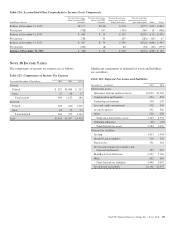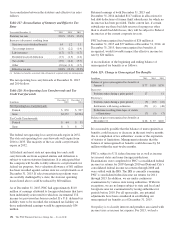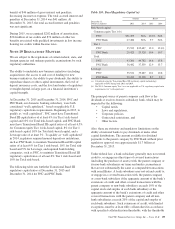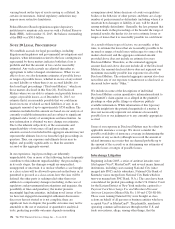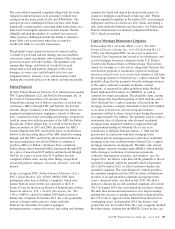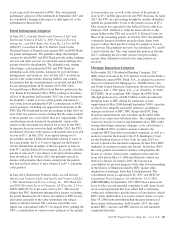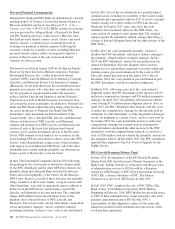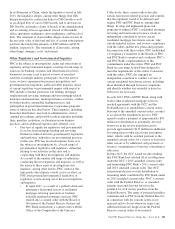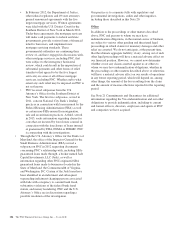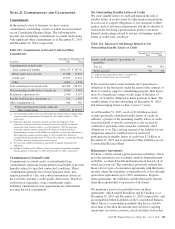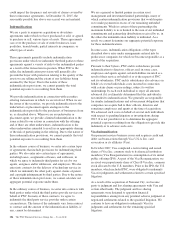PNC Bank 2015 Annual Report Download - page 214
Download and view the complete annual report
Please find page 214 of the 2015 PNC Bank annual report below. You can navigate through the pages in the report by either clicking on the pages listed below, or by using the keyword search tool below to find specific information within the annual report.
varying based on the type of assets serving as collateral. In
certain circumstances, federal regulatory authorities may
impose more restrictive limitations.
Federal Reserve Board regulations require depository
institutions to maintain cash reserves with a Federal Reserve
Bank (FRB). At December 31, 2015, the balance outstanding
at the FRB was $30.0 billion.
N
OTE
20 L
EGAL
P
ROCEEDINGS
We establish accruals for legal proceedings, including
litigation and regulatory and governmental investigations and
inquiries, when information related to the loss contingencies
represented by those matters indicates both that a loss is
probable and that the amount of loss can be reasonably
estimated. Any such accruals are adjusted thereafter as
appropriate to reflect changed circumstances. When we are
able to do so, we also determine estimates of possible losses
or ranges of possible losses, whether in excess of any related
accrued liability or where there is no accrued liability, for
disclosed legal proceedings (“Disclosed Matters,” which are
those matters disclosed in this Note 20). For Disclosed
Matters where we are able to estimate such possible losses or
ranges of possible losses, as of December 31, 2015, we
estimate that it is reasonably possible that we could incur
losses in excess of related accrued liabilities, if any, in an
aggregate amount of up to approximately $550 million. The
estimates included in this amount are based on our analysis of
currently available information and are subject to significant
judgment and a variety of assumptions and uncertainties. As
new information is obtained we may change our estimates.
Due to the inherent subjectivity of the assessments and
unpredictability of outcomes of legal proceedings, any
amounts accrued or included in this aggregate amount may not
represent the ultimate loss to us from the legal proceedings in
question. Thus, our exposure and ultimate losses may be
higher, and possibly significantly so, than the amounts
accrued or this aggregate amount.
In our experience, legal proceedings are inherently
unpredictable. One or more of the following factors frequently
contribute to this inherent unpredictability: the proceeding is
in its early stages; the damages sought are unspecified,
unsupported or uncertain; it is unclear whether a case brought
as a class action will be allowed to proceed on that basis or, if
permitted to proceed as a class action, how the class will be
defined; the other party is seeking relief other than or in
addition to compensatory damages (including, in the case of
regulatory and governmental investigations and inquiries, the
possibility of fines and penalties); the matter presents
meaningful legal uncertainties, including novel issues of law;
we have not engaged in meaningful settlement discussions;
discovery has not started or is not complete; there are
significant facts in dispute; the possible outcomes may not be
amenable to the use of statistical or quantitative analytical
tools; predicting possible outcomes depends on making
assumptions about future decisions of courts or regulatory
bodies or the behavior of other parties; and there are a large
number of parties named as defendants (including where it is
uncertain how damages or liability, if any, will be shared
among multiple defendants). Generally, the less progress that
has been made in the proceedings or the broader the range of
potential results, the harder it is for us to estimate losses or
ranges of losses that it is reasonably possible we could incur.
As a result of these types of factors, we are unable, at this
time, to estimate the losses that are reasonably possible to be
incurred or ranges of such losses with respect to some of the
matters disclosed, and the aggregate estimated amount
provided above does not include an estimate for every
Disclosed Matter. Therefore, as the estimated aggregate
amount disclosed above does not include all of the Disclosed
Matters, the amount disclosed above does not represent our
maximum reasonably possible loss exposure for all of the
Disclosed Matters. The estimated aggregate amount also does
not reflect any of our exposure to matters not so disclosed, as
discussed below under “Other.”
We include in some of the descriptions of individual
Disclosed Matters certain quantitative information related to
the plaintiff’s claim against us as alleged in the plaintiff’s
pleadings or other public filings or otherwise publicly
available information. While information of this type may
provide insight into the potential magnitude of a matter, it
does not necessarily represent our estimate of reasonably
possible loss or our judgment as to any currently appropriate
accrual.
Some of our exposure in Disclosed Matters may be offset by
applicable insurance coverage. We do not consider the
possible availability of insurance coverage in determining the
amounts of any accruals (although we record the amount of
related insurance recoveries that are deemed probable up to
the amount of the accrual) or in determining any estimates of
possible losses or ranges of possible losses.
Interchange Litigation
Beginning in June 2005, a series of antitrust lawsuits were
filed against Visa®, MasterCard®, and several major financial
institutions, including cases naming National City (since
merged into PNC) and its subsidiary, National City Bank of
Kentucky (since merged into National City Bank which in
turn was merged into PNC Bank, N.A.). The cases have been
consolidated for pretrial proceedings in the U.S. District Court
for the Eastern District of New York under the caption In re
Payment Card Interchange Fee and Merchant-Discount
Antitrust Litigation (Master File No. 1:05-md-1720-JG-JO).
Those cases naming National City were brought as class
actions on behalf of all persons or business entities who have
accepted Visa®or MasterCard®. The plaintiffs, merchants
operating commercial businesses throughout the U.S. and
trade associations, allege, among other things, that the
196 The PNC Financial Services Group, Inc. – Form 10-K



